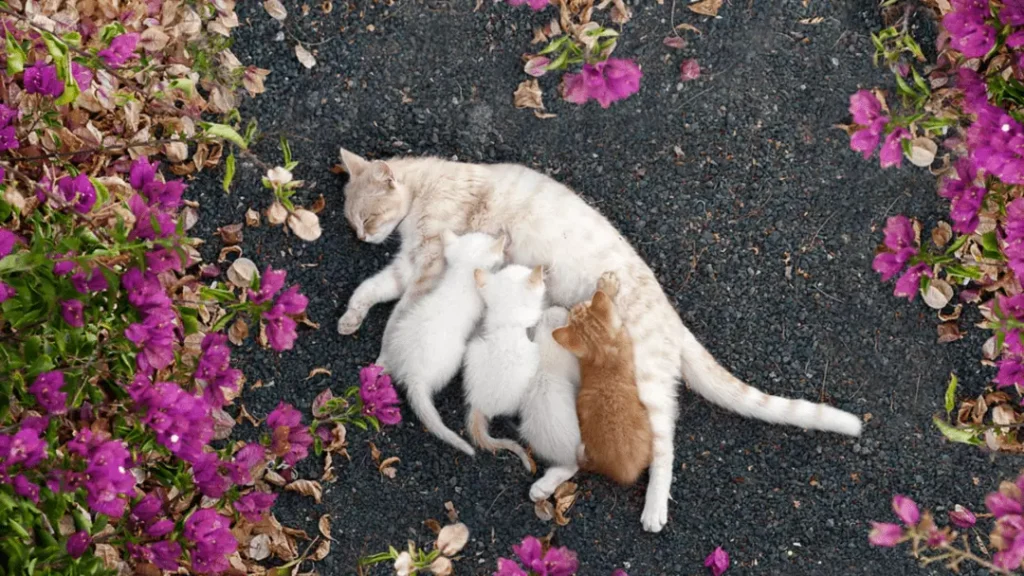
Want to spray your new cat mom to prevent becoming pregnant again or keep the house clean of urination and yowl? What about the newborn kittens? Can cats breastfeed after being sprayed?
If you don’t want to increase the production of kittens in the house anymore, you can spray the cat after 5 weeks of giving birth. Anytime earlier than this can puts the health of both the cat mom and her kittens at severe risk.
Read on to understand the right time to spray a breastfeeding cat, the risk of rushing, and some of the benefits of spaying and neutering a cat.
Can Cats Breastfeed After Being Spayed?
Yes, cats’ moms can breastfeed their kittens after being sprayed. In general, cats require 12 to 24 hours to recover from spay surgery, and a veterinarian will help your mother cat return to nursing her kitten quickly. If the kitten reaches 6 weeks of age, feed it food and start weaning anyway. Though it’s better to wait until the kitten is weaned, waiting longer can let the cat mom become pregnant again.
In addition, a 7-week-old kitten can eat a large amount of food easily. Many vets don’t recommend spraying a cat that is nursing. The reason is that the whole stomach is covered by mammary tissue, and it’s quite hard to avoid cutting into it and preventing the milk from polluting the incision.
The sutured area also becomes very painful, and it can feel the cat’s mother’s discomfort during nursing the kittens. So, if possible, wean the kittens and wait a few weeks before removing the kitten from her to allow the glands to shrink.
Even they need to be very careful during surgery. Otherwise, any accidental cut to the mammary glands can cause infection.
In short, cats can breastfeed after being spayed. But it’s better to wait until the kitten is weaned. If there is no way to wait, the vet must be careful during surgery and monitor the cat mom and kitten carefully.
Why You Shouldn’t Spray A Breastfeeding Cat?
Though you already get some clue about not spraying a breastfeeding mom, following the brief discussion of those downsides or potential risks:
Rupture of the Stitches
Typically, the breastfeeding process is intense for cat moms. The kittens need to knead the mom’s breasts to induce the oxytocin flow and create the milk flow.
Kneading is a process of pushing the paws in and out alongside the mammary glands. Apart from creating milk flow, kneading is also essential for showing comfort, contentment, and joy. Though kneading is a helpful and natural process, it’s very risky and painful for cat moms, particularly after surgery.
The kneading can tear apart the stitches, making the incision area exposed, if the process is done by jumping and pawing on the mum. In addition, if the wound exposes germs, they can cause infection and introduce severe health issues.
Disruption of Nursing
A breastfeeding cat should feel relaxed, happy, and stress-free so she can produce sufficient milk. But spraying through surgery can cause pain and stress. And after the surgery, the cat’s mom will feel pain in the incision area.
The thought of a hungry kitten pawing and kneading its abdomen will initially frighten the cat. Hence, some cat moms refuse to breastfeed their kittens. In this case, bottle-feed the kittens until they start eating food.
Surgical Complications
During breastfeeding, the blood flow in the mammary glands of the cat increases. It can make the spray surgery bloody. More importantly, most of the mammary gland is located in the stomach area. Due to the lack of care during surgery, the vet may rip the gland, which can spill milk in the incision and cause infections.
When Can I Get My Cat Spayed After Having Kittens?
The right time to spray a cat after giving birth depends on the cat and the speed of weaning the kittens. In general, you can spray your cat’s mom after 4 to 8 weeks of giving birth. Since the cat’s mom nurses her kittens continuously, you should give her enough time to breastfeed before spraying.
Otherwise, forcing her to spray earlier can make the spraying procedure complicated because of her bloated mammary glands. Even many veterinarians advice against spraying a cat mom until the kitten has completely weaned.
Can A Pregnant Cat Be Spayed?
If you want to avoid the hazards of spraying a breastfeeding cat, you can spray her when she is pregnant. It’s possible to spray a pregnant cat at any time during pregnancy. However, the vet may charge a higher fee to spray a pregnant cat.
The reason is that the operation will be more time-consuming and tiresome as it needs to remove the developing kittens and the rest of the uterus.
However, if your pregnant cat reaches a certain stage of pregnancy, a vet might not agree to spray her. Hence, many experts recommend spraying a newly adopted cat when she is supposed to become pregnant.
Some Key Reasons To Spay Cats
Spraying a cat is essential to avoid pet overpopulation issues. Even the people who work in rescue organizations believe that there are a huge number of kittens living without homes. Apart from that, spray cat also delivers some exciting benefits, and some highlighted points are:
Medical Advantage
Spraying a cat can give her a healthier life and help her live longer. While around 90% of cats are prone to causing breast tumors and uterine infections, this surgery can help prevent these health diseases. Even spraying a cat before the first heat ensures optimum protection against those diseases.
In addition, neutering a male cat lowers the chance of testicular cancer and other prostate issues.
Behavioral Advantages
A sprayed cat won’t become pregnant. In the breeding season, their feelings usually go into heat for 4 to 5 days every 3 weeks, which may vary from cat to cat. During this time, cats urinate and yowl more often, even all over the house, to attract mates.
Neutering a male cat will help you keep him in the house. In general, an intact male can do plenty of unwanted things to get a mate, including remaining outside most of the time. This can increase the risk of accidents and fighting with an opponent.
Conversely, sprayed cats behave well. While unneutered cats spray smelly urine all around to mark territory, neutered cats are less likely to mount other objects. Even neutering a cat after adoption can help prevent many aggression issues.
FAQs
1. How quickly can a cat become pregnant after giving birth?
The pregnancy of a cat lasts around 9 weeks, or 63 to 65 days. After giving birth, a cat can become pregnant again very quickly. Nursing kitchens can’t prevent pregnancy, and your cat’s next heat may happen within a few weeks after having kittens.
2. Can a cat give birth after being spayed?
No, during the spraying surgery, the vet removes the uterus and ovaries. As a result, the cat won’t be able to become pregnant again. However, your spayed cat can look pregnant because of the sudden removal of hormones. In addition, the development of mammary tissue and behavioral changes are also symptoms of false pregnancy.
3. Can spaying a pregnant cat kill the kittens?
Spraying a pregnant cat sounds like an abortion. Vets don’t want to kill unborn kittens, hence, they recommend spraying non-pregnant cats to prevent giving birth. In addition to spraying, a pregnant cat can kill fetuses or euthanize identifiable embryos.
Final Words
Once for all, cats can breastfeed after being sprayed though it can be scary and painful for them. Even surgery can introduce various diseases to a new cat mom and pose health risks to the kittens. It is also more expensive to spray a cat mom than a non-pregnant cat. As a result, it’s best to spray a cat after 5 weeks of giving birth to allow them to feed the kitten comfortably and ensure proper kitten growth.

